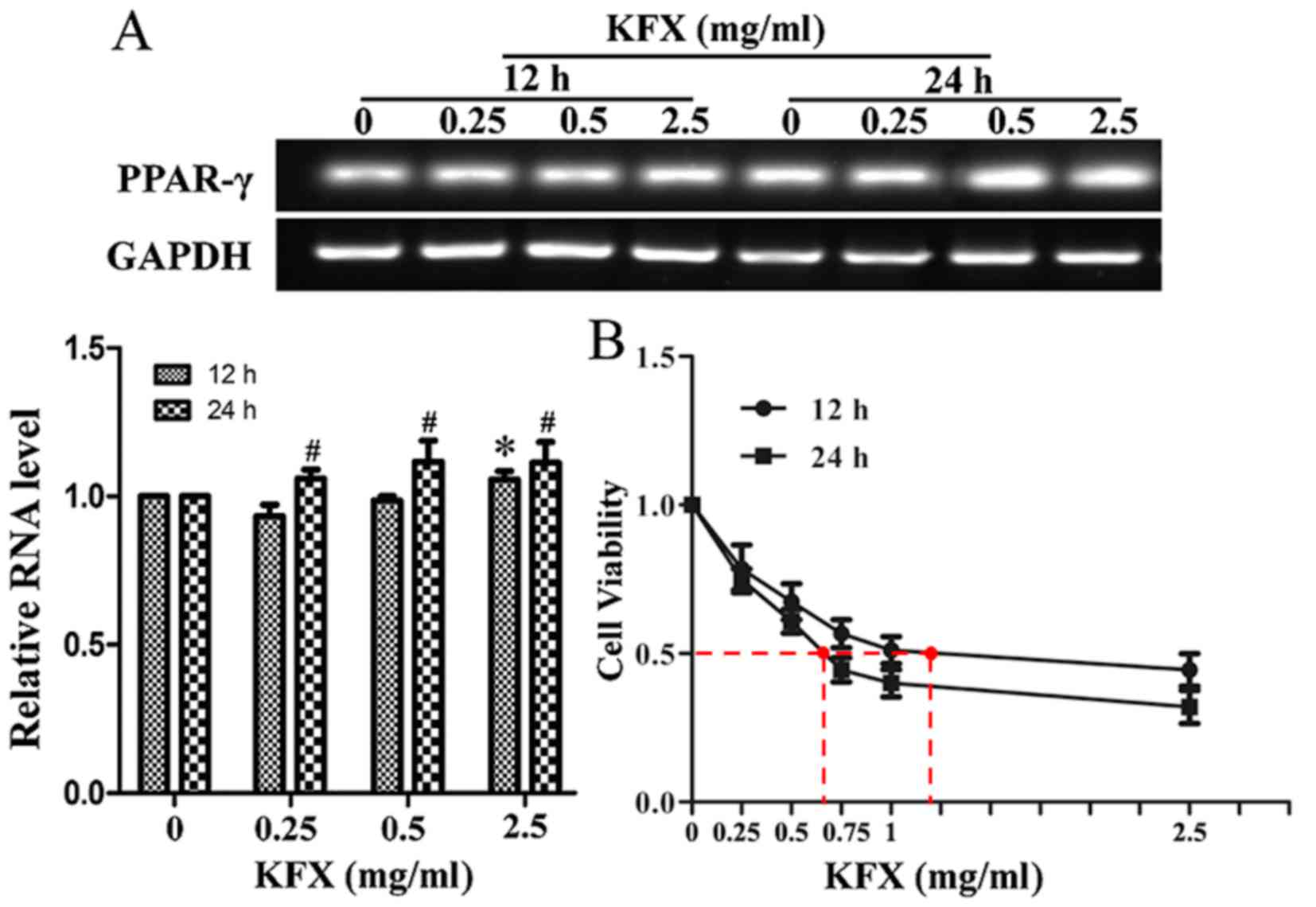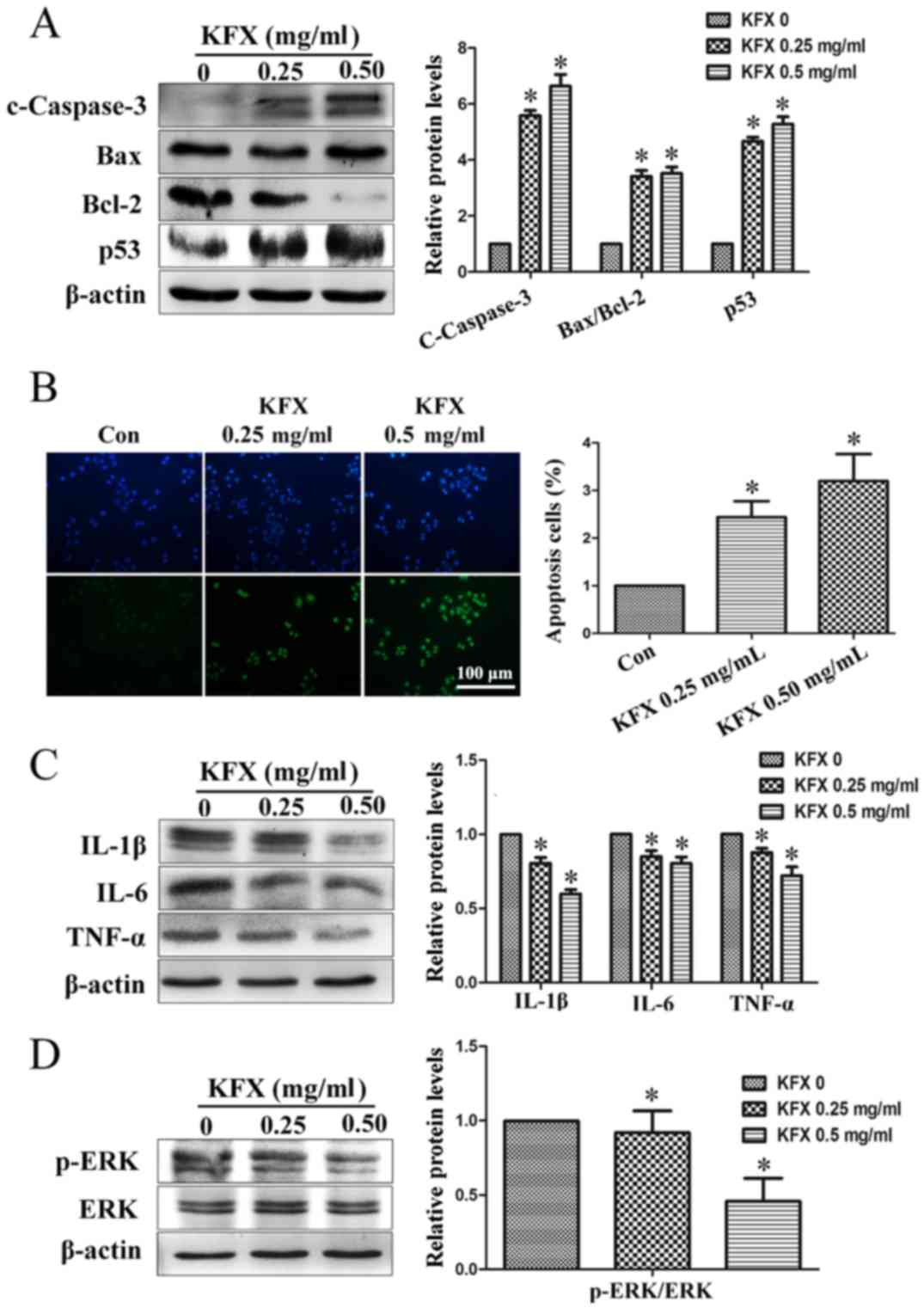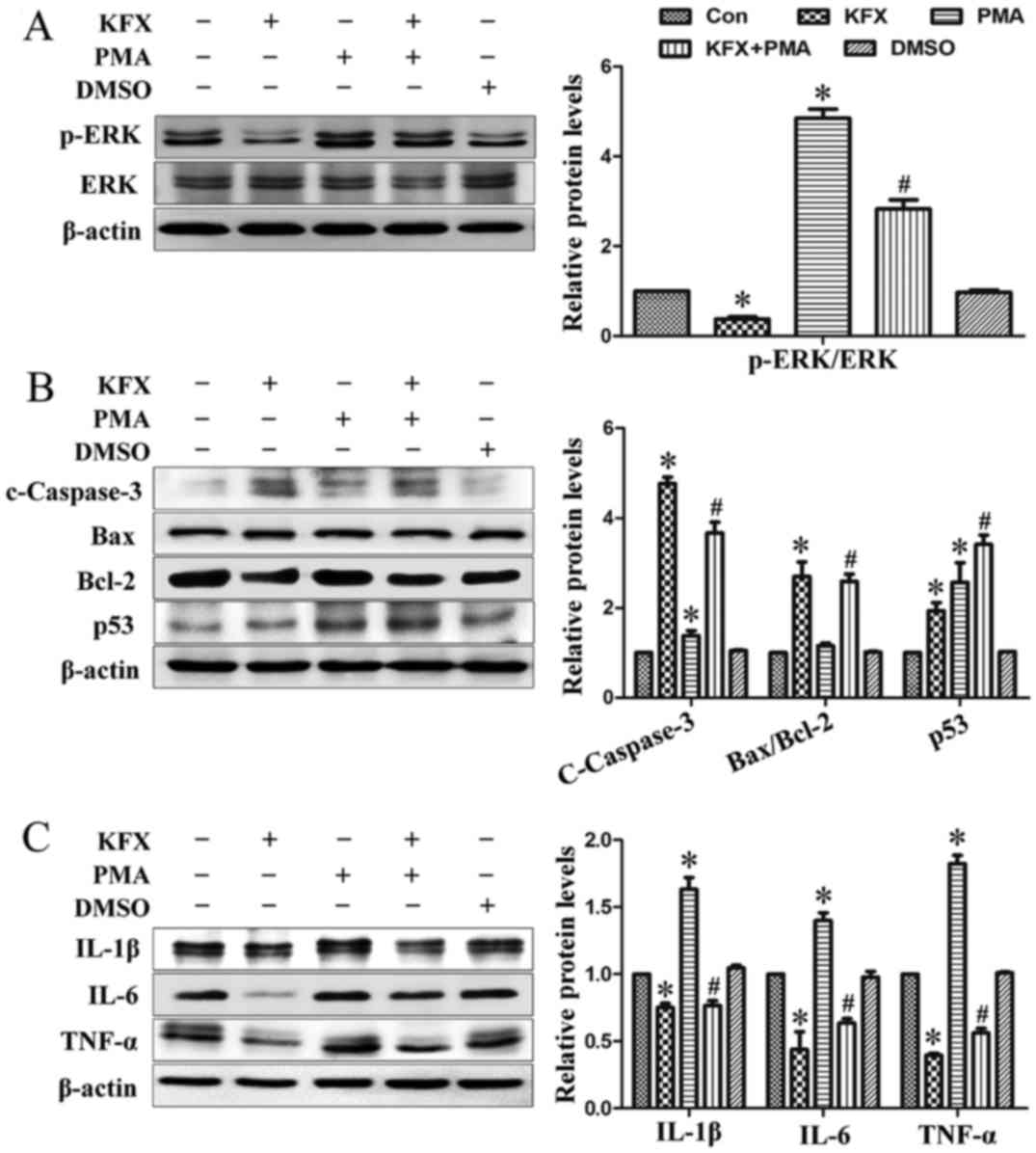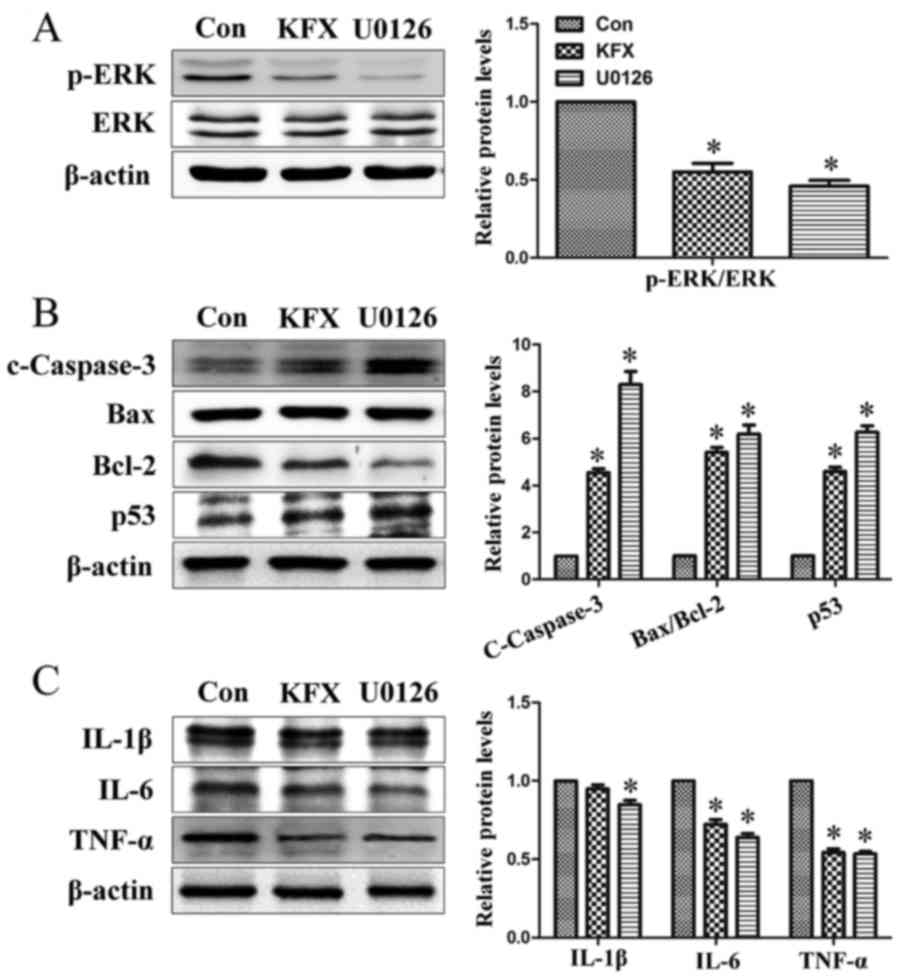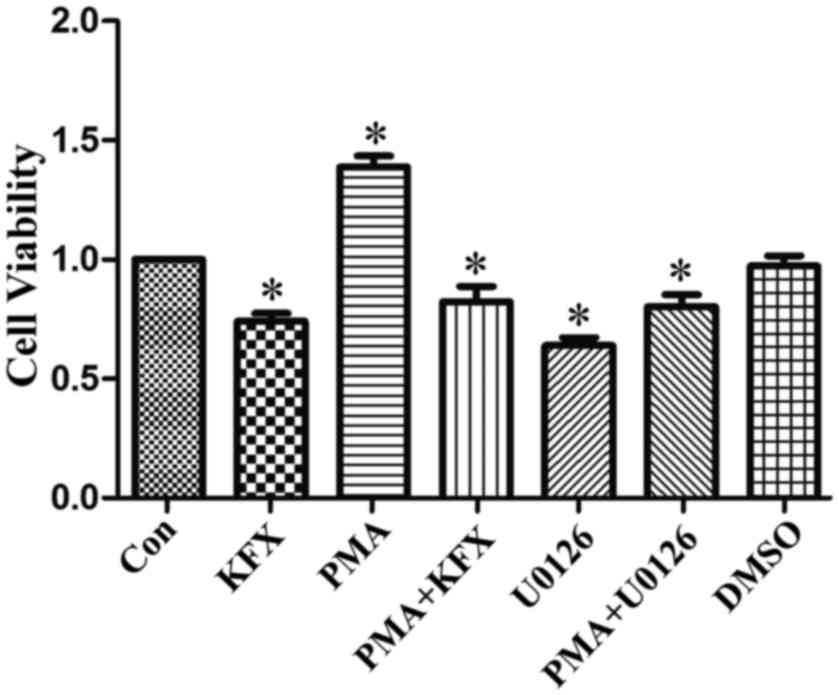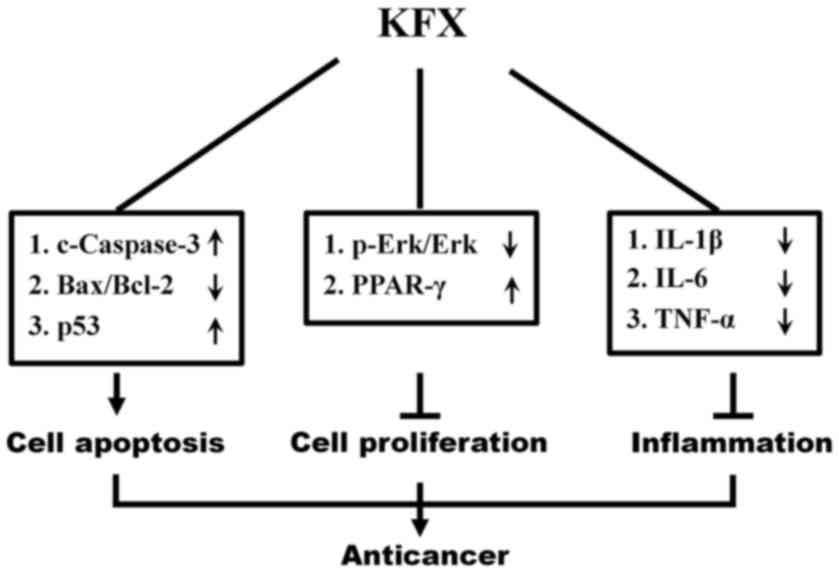|
1
|
Yu J, Wang X, Li Y and Tang B: Tanshinone
IIA suppresses gastric cancer cell proliferation and migration by
downregulation of FOXM1. Oncol Rep. 37:1394–1400. 2017. View Article : Google Scholar : PubMed/NCBI
|
|
2
|
de Martel C, Eorman D and Plummer M:
Gastric cancer: Epidemiology and risk factors. Gastroenterol Clin
North Am. 42:219–240. 2013. View Article : Google Scholar : PubMed/NCBI
|
|
3
|
Zheng HC, Zheng YS, Li XH, Takahashi H,
Hara T, Masuda S, Yang XH, Guan YF and Takano Y: Arp2/3
overexpression contributed to pathogenesis, growth and invasion of
gastric carcinoma. Anticancer Res. 28:2225–2232. 2008.PubMed/NCBI
|
|
4
|
Sherr CJ: Principles of tumor suppression.
Cell. 116:235–246. 2004. View Article : Google Scholar : PubMed/NCBI
|
|
5
|
André T, Boni C, Navarro M, Tabernero J,
Hickish T, Topham C, Bonetti A, Clingan P, Bridgewater J, Rivera F
and de Gramont A: Improved overall survival with oxaliplatin,
fluorouracil, and leucovorin as adjuvant treatment in stage II or
III colon cancer in the MOSAIC trial. J Clin Oncol. 27:3109–3116.
2009. View Article : Google Scholar : PubMed/NCBI
|
|
6
|
Chinese Materia Medica Editoral Committee:
Chinese Materia Medica. 9. Shanghai Scientific and Technical
Publisher; Shanghai: pp. 149–151. 1999
|
|
7
|
Sun XY: Sheng Nong's herbal classic.
Beijing Commercial Press; Beijing: pp. 90–91. 1955
|
|
8
|
Jiang Y, Wang X, Jin C, Chen X, Li J, Wu
Z, Liu G and Li S: Inhibitory effect of Periplaneta
Americana extract on 3LL lung cancer in mice. Zhongguo Fei Ai
Za Zhi. 9:488–491. 2006.(In Chinese). PubMed/NCBI
|
|
9
|
Li W, Duan LF, He GQ, Shen ZQ, Yang HQ and
Liang YP: Periplaneta americana extract effects on
experimental liver fibrosis. Lishizhen Med Mater Med Res.
21:1137–1138. 2010.
|
|
10
|
He ZC, Peng F, Song LY, Wang XY, Hu MH,
Zhao Y and Liu GM: Review on investigations related to chemical
constituents and biological activities of Periplaneta
americana. Zhongguo Zhong Yao Za Zhi. 32:2326–2331. 2007.(In
Chinese). PubMed/NCBI
|
|
11
|
Sun YN: Apoptosis pathway for targets of
anti-tumor treatment research progress. Foreign Med Sci (Sect
Pharmarcy). 33:321–324. 2006.
|
|
12
|
Chen P, Shen Y, Shi H, Ma X, Lin B, Xiao
T, Wu F, Zhu J, Li Z, Xiao J, et al: Gastroprotective effects of
Kangfuxin-against ethanol-induced gastric ulcer via attenuating
oxidative stress and ER stress in mice. Chem Biol Interact. Oct
28–2016.(Epub ahead of print). View Article : Google Scholar
|
|
13
|
Luo SL, Huang XJ, Wang Y, Jiang RW, Wang
L, Bai LL, Peng QL, Song CL, Zhang DM and Ye WC: Isocoumarins from
American cockroach (Periplaneta americana) and their
cytotoxic activities. Fitoterapia. 95:115–120. 2014. View Article : Google Scholar : PubMed/NCBI
|
|
14
|
Zhang H, Wei L, Zhang Z, Liu S, Zhao G,
Zhang J and Hu Y: Protective effect of Periplaneta americana
extract on intestinal mucosal barrier function in patients with
sepsis. J Tradit Chin Med. 33:70–73. 2013. View Article : Google Scholar : PubMed/NCBI
|
|
15
|
Yuan F, Liu J, Qiao T, Li T, Shen Q and
Peng F: The effects and mechanisms of Periplaneta americana
extract reversal of multi-drug resistance in BEL-7402/5-FU cells.
Molecules. 21:pii: E852. 2016. View Article : Google Scholar
|
|
16
|
Chen PP, Ma XY, Lin Q, Xu HL, Shi HX,
Zhang HY, Xiao J, Geng FN and Zhao YZ: Kangfuxin promotes apoptosis
of gastric cancer cells through activating ER-stress and autophagy.
Mol Med Rep. 16:9043–9050. 2017. View Article : Google Scholar : PubMed/NCBI
|
|
17
|
Kim S, Lee JJ and Heo DS: PPARγ ligands
induce growth inhibition and apoptosis through p63 and p73 in human
ovarian cancer cells. Biochem Biophys Res Commun. 406:389–395.
2011. View Article : Google Scholar : PubMed/NCBI
|
|
18
|
Tsai CY, Wang CC, Lai TY, Tsu HN, Wang CH,
Liang HY and Kuo WW: Antioxidant effects of diallyl trisulfide on
high glucose-induced apoptosis are mediated by the
PI3K/Akt-dependent activation of Nrf2 in cardiomyocytes. Int J
Cardiol. 168:1286–1297. 2013. View Article : Google Scholar : PubMed/NCBI
|
|
19
|
Kersten S, Desvergne B and Wahli W: Roles
of PPARs in health and disease. Nature. 405:421–424. 2000.
View Article : Google Scholar : PubMed/NCBI
|
|
20
|
Brown CJ, Lain S, Verma CS, Fersht AR and
Lane DP: Awakening guardian angels: Drugging the p53 pathway. Nat
Rev Cancer. 9:862–873. 2009. View
Article : Google Scholar : PubMed/NCBI
|
|
21
|
Akinyeke TO and Stewart LV: Troglitazone
suppresses c-Myc levels in human prostate cancer cells via a
PPARγ-independent mechanism. Cancer Biol Ther. 11:1046–1058. 2011.
View Article : Google Scholar : PubMed/NCBI
|
|
22
|
Na HK and Surh YJ: Peroxisome
proliferator-activated receptor gamma (PPARgamma) ligands as
bifunctional regulators of cell proliferation. Biochem Pharmacol.
66:1381–1391. 2003. View Article : Google Scholar : PubMed/NCBI
|
|
23
|
Garcia-Bates TM, Lehmann GM,
Simpson-Haidaris PJ, Bernstein SH, Sime PJ and Phipps RP: Role of
peroxisome proliferator-activated receptor gamma and its ligands in
the treatment of hematological malignancies. PPAR Res.
2008:8346122008. View Article : Google Scholar : PubMed/NCBI
|
|
24
|
Dmitrieva OS, Shilovskiy IP, Khaitov MR
and Grivennikov SI: Interleukins 1 and 6 as main mediators of
inflammation and cancer. Biochemistry (Mosc). 81:80–90. 2016.
View Article : Google Scholar : PubMed/NCBI
|
|
25
|
Tawara K, Oxford JT and Jorcyk CL:
Clinical significance of interleukin (IL)-6 in cancer metastasis to
bone: potential of anti-IL-6 therapies. Cancer Manag Res.
3:177–189. 2011.PubMed/NCBI
|
|
26
|
Chang Q, Bournazou E, Sansone P, Berishaj
M, Gao SP, Daly L, Wels J, Theilen T, Granitto S, Zhang X, et al:
The IL-6/JAK/Stat3 feed-forward loop drives tumorigenesis and
metastasis. Neoplasia. 15:848–862. 2013. View Article : Google Scholar : PubMed/NCBI
|
|
27
|
Yang M and Huang CZ: Mitogen-activated
protein kinase signaling pathway and invasion and metastasis of
gastric cancer. World J Gastroenterol. 21:11673–11679. 2015.
View Article : Google Scholar : PubMed/NCBI
|
|
28
|
Ji CD, Wang YX, Xiang DF, Liu Q, Zhou ZH,
Qian F, Yang L, Ren Y, Cui W, Xu SL, et al: Kir2.1 interaction with
Stk38 promotes invasion and metastasis of human gastric cancer by
enhancing MEKK2-MEK1/2-ERK1/2 signaling. Cancer Res. Mar
16–2018.(Epub ahead of print). View Article : Google Scholar
|
|
29
|
Shin BA, Yoo HG, Kim HS, Kim MH, Hwang YS,
Chay KO, Lee KY, Ahn BW and Jung YD: P38 MAPK pathway is involved
in the urokinase plasminogen activator expression in human gastric
SNU-638 cells. Oncol Rep. 10:1467–1471. 2003.PubMed/NCBI
|
|
30
|
Rubinfeld H and Seger R: The ERK cascade:
A prototype of MAPK signaling. Mol Biotechnol. 31:151–174. 2005.
View Article : Google Scholar : PubMed/NCBI
|
|
31
|
Murphy LO and Blenis J: MARK signal
specificity: the right place at the right time. Trends Biochem Sci.
31:268–275. 2006. View Article : Google Scholar : PubMed/NCBI
|
|
32
|
Zhang L, Stuber F, Lippuner C, Schiff M
and Stamer UM: Phorbol-12-myristate-13-acetate induces nociceptin
in human Mono Mac 6 cells via multiple transduction signalling
pathways. Br J Anaesth. 117:250–257. 2016. View Article : Google Scholar : PubMed/NCBI
|
|
33
|
World Health Organization (WHO): Cancer:
Fact Sheet No 297. WHO; Geneva: 2015, http://www.who.int/mediacentre/factsheets/fs297/en/May
21–2015
|
|
34
|
National Cancer Institute (NCI): Cancer
Stat Facts: Stomach Cancer. NCI; Bethesda, MD: 2015, http://seer.cancer.gov/statfacts/html/stomach.htmlMay
21–2015
|
|
35
|
Nishikawa K, Tsuburaya A, Yoshikawa T,
Takahashi M, Tanabe K, Yamaguchi K, Yoshino S, Namikawa T, Aoyama
T, Rino Y, et al: A phase II trial of capecitabine plus cisplatin
(XP) for patients with advanced gastric cancer with early relapse
after S-1 adjuvant therapy: XParTS-I trial. Gastric Cancer. Feb
27–2018.(Epub ahead of print). View Article : Google Scholar
|
|
36
|
Abdel-Razeq H, Mansour A, Abdulelah H,
Al-Shwayat A, Makoseh M, Ibrahim M, Abunasser M, Rimawi D,
Al-Rabaiah A, Alfar R, et al: Thromboembolic events in cancer
patients on active treatment with cisplatin-based chemotherapy:
Another look! Thromb J. 16:22018. View Article : Google Scholar : PubMed/NCBI
|
|
37
|
Kim SM and Park SH: Chemotherapy beyond
second-line in advanced gastric cancer. World J Gastroenterol.
21:8811–8116. 2015. View Article : Google Scholar : PubMed/NCBI
|
|
38
|
Budchart P, Khamwut A, Sinthuvanich C,
Ratanapo S, Poovorawan Y and T-Thienprasert NP: Partially purified
gloriosa superba peptides inhibit colon cancer cell viability by
inducing apoptosis through p53 upregulation. Am J Med Sci.
354:423–429. 2017. View Article : Google Scholar : PubMed/NCBI
|
|
39
|
Lin SR, Fu YS, Tsai MJ, Cheng H and Weng
CF: Natural compounds from herbs that can potentially execute as
autophagy inducers for cancer therapy. Int J Mol. 18:pii: E1412.
2017.
|
|
40
|
Zhu X, Li Z, Li T, Long F, Lv Y, Liu L,
Liu X and Zhan Q: Osthole inhibits the PI3K/AKT signaling pathway
via activation of PTEN and induces cell cycle arrest and apoptosis
in esophageal squamous cell carcinoma. Biomed Pharmacother.
102:502–509. 2018. View Article : Google Scholar : PubMed/NCBI
|
|
41
|
Maryam A, Mehmood T, Yan Q, Li Y, Khan M
and Ma T: Proscillaridin a promotes oxidative stress and ER stress,
inhibits STAT3 activation and induces apoptosis in A549 lung
adenocarcinoma cells. Oxid Med Cell Longev. 2018:38534092018.
View Article : Google Scholar : PubMed/NCBI
|
|
42
|
Yu J, Peng H, Lin Y and Yi S: Effect of
moxibustion treatment on cell apoptosis and expressions of heat
shock protein and second mitochondrial activator of caspase in
acute gastric mucosal lesion of rats. J Tradit Chin Med.
33:258–261. 2013. View Article : Google Scholar : PubMed/NCBI
|
|
43
|
Zhang R, He Y, Zhang X, Xing B, Sheng Y,
Lu H and Wei Z: Estrogen receptor-regulated microRNAs contribute to
the BCL2/BAX imbalance in endometrial adenocarcinoma and
precancerous lesions. Cancer Lett. 314:155–165. 2012. View Article : Google Scholar : PubMed/NCBI
|
|
44
|
Harris BRE, Wang D, Zhang Y, Ferrari M,
Okon A, Cleary MP, Wagner CR and Yang DQ: Induction of the p53
tumor suppressor in cancer cells through inhibition of
cap-dependent translation. Mol Cell Biol. Feb 26–2018.(Epub ahead
of print). View Article : Google Scholar : PubMed/NCBI
|
|
45
|
Baillie TA: Metabolism and toxicity of
drugs. Two decades of progress in industrial drug metabolism. Chem
Res Toxicol. 21:129–137. 2008. View Article : Google Scholar : PubMed/NCBI
|















